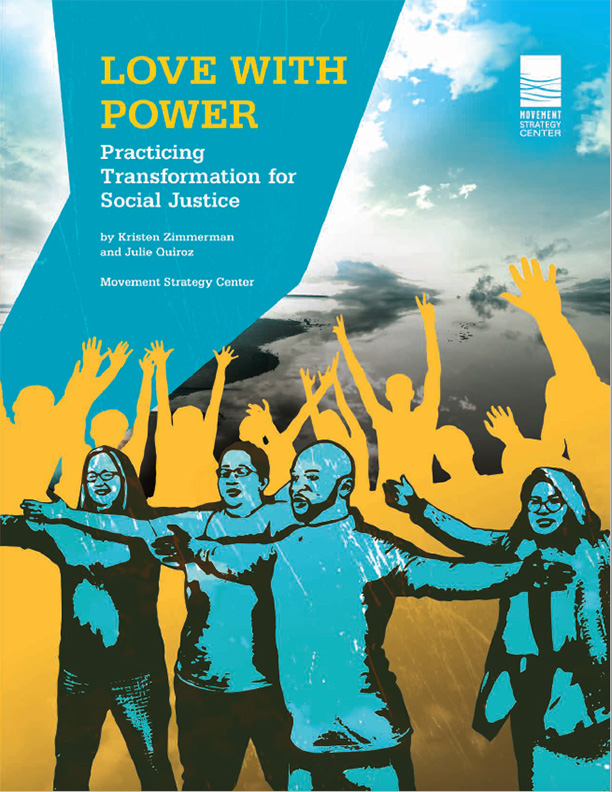With Great Love, MSC Offers This Excerpt From Love With Power: Practicing Transformation for Social Justice by Julie Quiroz and Kristen Zimmerman
Originally Published on February 12, 2015.
We, humanity, need a movement, a really big movement.
A movement big and bold enough to get us out of the mess we have gotten ourselves into, and one that will get us to a better place.
A movement that can transform the world and each one of us in it.
A movement through which we shift from a world based on domination and extraction to a life-affirming world based on regeneration and interconnection.
Over the past decade, Movement Strategy Center (MSC) has explored the big yet simple questions echoing across social justice movements: what is the change we most need and want in the world? Who do we need to be to make that change? How do we get there, all of us, together?
On this journey we are learning from and experimenting alongside many incredible people who are charting the way forward. We are excited to see that the contours of where we need to go — and who we need to be to find our path — are beginning to emerge.
The transformation we need in the world requires what Grace Lee Boggs calls a revolution of values: one that includes systems and political leadership but that stretches beyond to shift the very DNA of our culture and the people encoded within it. This is a revolution that can be actualized and sustained because it leads from the power of love to fundamentally change individuals and groups, communities and systems. It’s a revolution that does not divide or conquer but instead, as Taoist strategist Sun Tzu writes in the Art of War, keeps everything under the universe whole.
When movements are transformative they radically shift the way we think, the way we relate to one another, and even the way we perceive change. They fundamentally alter the way our society and our communities are structured, the way we live with one another and even who we are. When movements embody our deepest human values they bring out the best in us, spark our imagination, inspire us, and embolden us to take big leaps forward together. Today, humanity and the planet need a movement of power and love that can catalyze and sustain the massive, integrated change we need right now.
There are many signs that “another world is not only possible, she’s on the way and, on a quiet day, if you listen very carefully you can hear her breathe.” At the heart of this movement — and the world it is bringing — are individuals and groups that have experienced deep change in themselves and have brought the power of intentional practice to catalyze this change. It is in their breath, our collective breath, that we can hear if we listen.

When tackling humanity’s biggest problems (e.g., slavery, apartheid, and colonization), only social movements, mass movements, have had the courage, inspiration, power, and practices to change the world and each of us in it. Social movements are about big, collective impact and a quality of change that is not possible through other means.
“Power without love is reckless and abusive, and love without power is sentimental and anemic. Power at its best is love implementing the demands of justice, and justice at its best is power correcting everything that stands against love.” – Martin Luther King Jr.
Social movements provide a scale in numbers, a scale of ambition, and a scale in our capacity to love and to redefine and harness power.
Through practicing transformation individuals and groups are developing the capacity they need to generate and navigate transformation in the world. Transformation — profound, fundamental, irreversible, sustainable change — depends on and is made possible by the internal shifts in people and groups, as well as on external shifts in our culture, systems, and lived reality. In transformative moments these two forms of change — internal and external — fuel each other in an interdependent catalytic dance. At times this change begins internally, at other times externally.
Real change requires us to believe that fundamental, irreversible, systemic change is possible and that we are each a part of that change. We begin by allowing ourselves to experience the hunger and appetite for something more than what we have now. We can then take intentional action to embody this change in ourselves and with one another.
Systems and structures are ultimately a reflection of human beings, of our relationship to ourselves and to one another. Collectively, we create, run, follow, condone, and/or fight against systems and structures. They, in turn, shape us, our relationship to one another and to the natural world. But, we can commit to a vision beyond what we have inherited. When we come together as a critical mass of people who are ready to fundamentally change ourselves simultaneously with our culture and its structures and systems, we can then achieve the fundamental change we desire.
In the words of Staci Haines, executive director of Generative Somatics, “we are at this unprecedented moment where the phase of critique is done. We need to create different structures and build different ways of being. We need to compel people with alternatives. We need to ask what institutions, economies, and social myths we need, to have masses of people embody cooperation, interdependence and sustainability.”
MSC and many others believe that transformative movements arise when individual and collective practice is embedded within a holistic path and a commitment to social transformation. Through practice we increase our awareness of the problem we are trying to solve and the personal and social patterns that keep the status quo in place. We open and allow ourselves to change in ways that feel fundamental to who we are. Transformative movement includes practice, cultivating ourselves personally and collectively to increase our skill, wisdom, relatedness, and vision. When we are involved in transformative movement, we hold a big and bold vision of the world we want, hone methods to catalyze and link internal and external change, and implement concrete practices to support and embody these shifts.
Today I have the honor of introducing Love With Power: Practicing Transformation for Social Justice, a new MSC publication that focuses on transformation guided by core human values including interconnection, dignity, justice, and love. MSC offers Love With Power as inspiration for all of us who believe that another world is possible and that we must find ways to get there together. In Love With Power we honor groups who are creating the new ways to bring about social transformation — organizers who believe the time for Love With Power is now.
We hope Love With Power will inspire social justice groups and other change agents to explore, adopt, and strengthen collective transformative movement building and practice as an intentional and ongoing part of their work.
Julie Quiroz (she/her) leads New Moon Collaborations, nurturing leaps in culture that transform systems and structures for generations to come.
Kristen Zimmerman is co-founder of Movement Strategy Center and Root. Rise. Pollinate!


